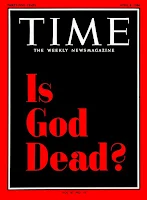The Case for God, by Karen Armstrong
Religious discourse was not intended to be understood literally because it was only possible to speak about a reality that transcended language in symbolic terms. ... The same applies to the creation myth that was central to ancient religion and now has become controversial in the Western world because the Genesis story seems to clash with modern science. But until the early modern period, nobody read a cosmology as a literal account of the origins of life. (p. 15)
This seems to imply that there were no conflicts over myths "until the early modern period." But of course there were. What Alfred North Whitehead called "the fallacy of misplaced concreteness" has always been with us. Ancient peoples believed that their gods and the records of their doings were more than just symbolic representations of "a reality that transcended language," and they were willing to go to war to prove it. The Bible vs. science controversy arises from a belief in the absolute truth of, on the one hand, Scripture, and on the other, scientific method. And each side fears that granting only symbolic status to any part of its ideology undermines the entire ideology and must therefore be fought for.
In our own day, the God of the monotheistic tradition has often degenerated into a High God. The rites and practices that once made him a persuasive symbol of the sacred are no longer effective, and people have stopped participating in them. He has therefore become otiosus, an etiolated reality who for all intents and purposes has indeed died or "gone away." (p. 16)
Hence the fury over the magazine cover that asked:

